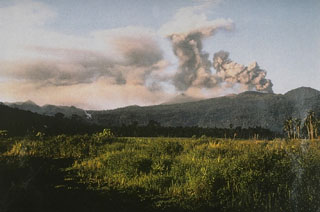Report on Dukono (Indonesia) — November 2008
Bulletin of the Global Volcanism Network, vol. 33, no. 11 (November 2008)
Managing Editor: Richard Wunderman.
Dukono (Indonesia) Ongoing minor ash plumes through at least 9 January 2009
Please cite this report as:
Global Volcanism Program, 2008. Report on Dukono (Indonesia) (Wunderman, R., ed.). Bulletin of the Global Volcanism Network, 33:11. Smithsonian Institution. https://doi.org/10.5479/si.GVP.BGVN200811-268010
Dukono
Indonesia
1.6992°N, 127.8783°E; summit elev. 1273 m
All times are local (unless otherwise noted)
Thermal hotspots and minor ash plumes were reported through September and early October 2008 (BGVN 33:08). Dukono continued to emit minor ash plumes from early October 2008 through 9 January 2009, although MODVOLC thermal alerts have been absent since 26 May 2008. Five instances of ash plumes were noted from 11 October 2008 to 9 January 2009, as recorded by the Darwin Volcanic Ash Advisory Centre (table 9). None of the plumes rose above 3 km altitude.
Table 9. Ash plumes reported from Dukono between 11 October 2008 and 9 January 2009 (UTC). Data from the Darwin Volcanic Ash Advisory Centre.
| Date (UTC) | Plume Altitude | Plume Direction | Plume Distance |
| 11 Oct 2008 | 3 km | WNW | ~110 km |
| 06-07 Nov 2008 | 2.4 km | WNW | ~72 km |
| 20 Nov 2008 | 3 km | NW | ~110 km |
| 15 Dec 2008 | 3 km | SE | ~160 km |
| 06 Jan 2009 | 1.8 km | E | ~90 km |
Geological Summary. Reports from this remote volcano in northernmost Halmahera are rare, but Dukono has been one of Indonesia's most active volcanoes. More-or-less continuous explosive eruptions, sometimes accompanied by lava flows, have occurred since 1933. During a major eruption in 1550 CE, a lava flow filled in the strait between Halmahera and the N-flank Gunung Mamuya cone. This complex volcano presents a broad, low profile with multiple summit peaks and overlapping craters. Malupang Wariang, 1 km SW of the summit crater complex, contains a 700 x 570 m crater that has also been active during historical time.
Information Contacts: Darwin Volcanic Ash Advisory Centre (VAAC), Bureau of Meteorology, Northern Territory Regional Office, PO Box 40050, Casuarina, NT 0811, Australia (URL: http://www.bom.gov.au/info/vaac/); Center of Volcanology and Geological Hazard Mitigation (CVGHM), Jalan Diponegoro 57, Bandung 40122, Indonesia (URL: http://vsi.esdm.go.id/); Hawai'i Institute of Geophysics and Planetology (HIGP) Thermal Alerts System, School of Ocean and Earth Science and Technology (SOEST), University of Hawai'i, 2525 Correa Road, Honolulu, HI 96822, USA (URL: http://modis.higp.hawaii.edu/).

